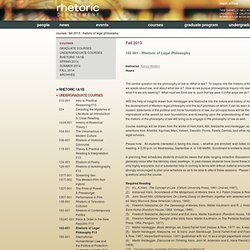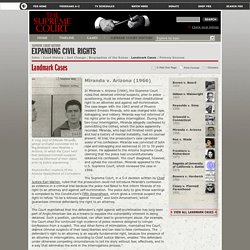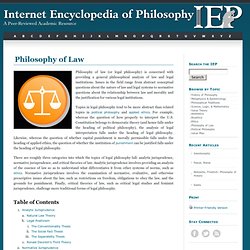

Riggs v Palmer. Philo Riggs, as Guardian ad litem et al., Appellants,vElmer E.

Palmer et al., Respondents. Court of Appeals of New York Submitted June 21, 1889 Decided October 8, 1889 115 NY 506 CITE TITLE AS: Riggs v Palmer On the 13th day of August 1880, Francis B. Palmer made his last will and testament, in which he gave small legacies to his two daughters, Mrs. It is quite true that statutes regulating the making, proof and effect of wills, and the devolution of property, if literally construed, and if their force and effect can in no way and under no circumstances be controlled or modified, give this property to the murderer. The purpose of those statutes was to enable testators to dispose of their estates to the objects of their bounty at death, and to carry into effect their final wishes legally expressed; and in considering and giving effect to them this purpose must be kept in view.
For the same reasons the defendant Palmer cannot take any of this property as heir. Legal Theory Lexicon. UCB Rhetoric - The central question for the philosophy of law is, What is law?

The Supreme Court . Expanding Civil Rights . Landmark Cases . Miranda v. Arizona (1966) A mug shot of Ernesto Miranda, whose wrongful conviction led to the landmark case Miranda v.

Arizona, in which the Court held that detained criminal suspects must be informed of their rights prior to police questioning. Reproduction courtesy of the Arizona Department of Corrections Miranda v. Arizona (1966) In Miranda v. The Court maintained that the defendant's right against self-incrimination has long been part of Anglo-American law as a means to equalize the vulnerability inherent in being detained. Legalism (Chinese philosophy) A blog dedicated to reports, commentary and the discussion of topical issues of international law. The Law In These Parts - שלטון החוק. Can a modern democracy impose a prolonged military occupation on another people while retaining its core democratic values?
Since Israel conquered the territories of the West Bank and Gaza Strip in the 1967 war, the military has imposed thousands of orders and laws, established military courts, sentenced hundreds of thousands of Palestinians, enabled half a million Israeli "settlers" to move to the Occupied Territories and developed a system of long-term jurisdiction by an occupying army that is unique in the entire world. The men entrusted with creating this new legal framework were the members of Israel's military legal corps. Explores this unprecedented and little-known story through testimonies of the military legal professionals who were the architects of the system and helped run it in its formative years. The Law In These Parts. Translate. Archives - lesoir.be. Les assises se relèvent-elles?

Page 16 Mardi 6 octobre 2009 n Belgique, la cour d’assises se prononce en deux phases. Dans un premier temps les jurés, tirés au sort parmi la population, se prononcent seuls sur la culpabilité de l’accusé. Ensuite, après un nouveau débat, la cour, composée de trois magistrats professionnels, les rejoint pour fixer le montant de la peine. Le 13 janvier 2009, la Cour européenne des droits de l’homme, à Strasbourg, a condamné la Belgique parce que les jurés ne motivent pas leur verdict. Depuis lors, les parlementaires tentent de trouver la parade à ce problème. Le Sénat a opté pour la deuxième solution. Pour la motivation, c’est l’option du Sénat qui est confirmée. L’Exécutif et le Législatif envisagent notamment de désengorger les cours d’assises dont les procès coûteraient trop cher. Toujours pour réduire les coûts, les sessions d’assises seraient écourtées. . « Une malhonnêteté intellectuelle » ean-Baptiste Andries est magistrat au parquet général de Liège.
(Belgian) Jury Trial System Counter to ECHR. Digitalcommons.liberty.edu/cgi/viewcontent.cgi?article=1230&context=gov_fac_pubs. KarlJaspers: Die geistige Situation der Zeit. Karl Jaspers' vier Schuldbegriffe (1946) Karl Jaspers' vier Schuldbegriffe (1946) In seiner 1946 erschienenen Schrift "Die Schuldfrage" setzte sich der Heidelberger Philosoph Karl Jaspers ausführlich mit der Frage von Schuld und Verantwortung für die Verbrechen des Nationalsozialismus auseinander.

Er stellte in diesem Zusammenhang vier Kategorien der Schuld auf: - die kriminelle Schuld aufgrund objektiv nachweisbarer Gesetzesverstöße, - die politische Schuld durch Handlungen der Staatsmänner, an denen der Einzelne durch seine Staatsbürgerschaft und durch seine Mitverantwortung, wie er regiert wird, beteiligt ist, - die moralische Schuld durch Handlungen, deren Charakter nicht allein dadurch nicht verbrecherisch wird, daß sie befohlen sind, - die metaphysische Schuld aus der Mitverantwortung für alles Unrecht und alle Ungerechtigkeit in der Welt (Wenn ich nicht tue, was ich kann, um es zu verhindern, so bin ich mitschuldig.).
Die Instanzen zur Klärung der einzelnen Kategorien der Schuld sind. Critical legal theory. Critical legal studies (CLS) is a theory that challenges and overturns accepted norms and standards in legal theory and practice. Proponents of this theory believe that logic and structure attributed to the law grow out of the power relationships of the society. The law exists to support the interests of the party or class that forms it and is merely a collection of beliefs and prejudices that legitimize the injustices of society. The wealthy and the powerful use the law as an instrument for oppression in order to maintain their place in hierarchy. The basic idea of CLS is that the law is politics and it is not neutral or value free.
Www.ucl.ac.uk/laws/jurisprudence/llm-01/docs0607/LLM01_syllabus.pdf. Www.ucl.ac.uk/laws/jurisprudence/docs/2012/2012_cecile_laborde.pdf. Lptforum.wordpress.com. Law, Philosophy of Philosophy of law (or legal philosophy) is concerned with providing a general philosophical analysis of law and legal institutions.

Issues in the field range from abstract conceptual questions about the nature of law and legal systems to normative questions about the relationship between law and morality and the justification for various legal institutions. Topics in legal philosophy tend to be more abstract than related topics in political philosophy and applied ethics. For example, whereas the question of how properly to interpret the U.S. UCB Rhetoric - UCB Rhetoric - Spring 2012. Understanding law as a matter of language requires attending to the ways that law hears and is heard.
Exploring the hearing of law leads into issues of experience and temporality to which speech act "theory" gives short shrift. Such a turn reorients both current models of legal positivism and contemporary representations of impartial justice which overemphasize issues of blindness and sight. As the readings of this seminar show, the turn to hearing also allows one to negotiate the materiality of the human condition while taking history seriously. In addition the required reading listed below, we will discuss selections, if not more, from Pitkin's Wittgenstein and Justice; Ricoeur's The Just and Truth and Narrative; Tomlins' Freedom Bound; and other legal, legal-historical, and legal-philosophical texts, depending on student interest. Attendance, participation, occasional short discussion papers and presentations will be required, as will a final 20-page paper. Required Reading. Leiter on Dworkin on "Justice for Hedgehogs" Brian Leiter (University of Chicago) has posted The Empire Strikes Back: Errors and Mistakes in "Justice for Hedgehogs" on SSRN.
Further comments by Ronald Dworkin. Justice: What's The Right Thing To Do? Episode 01 "THE MORAL SIDE OF MURDER". JEAN-MARC TRIGEAUD.